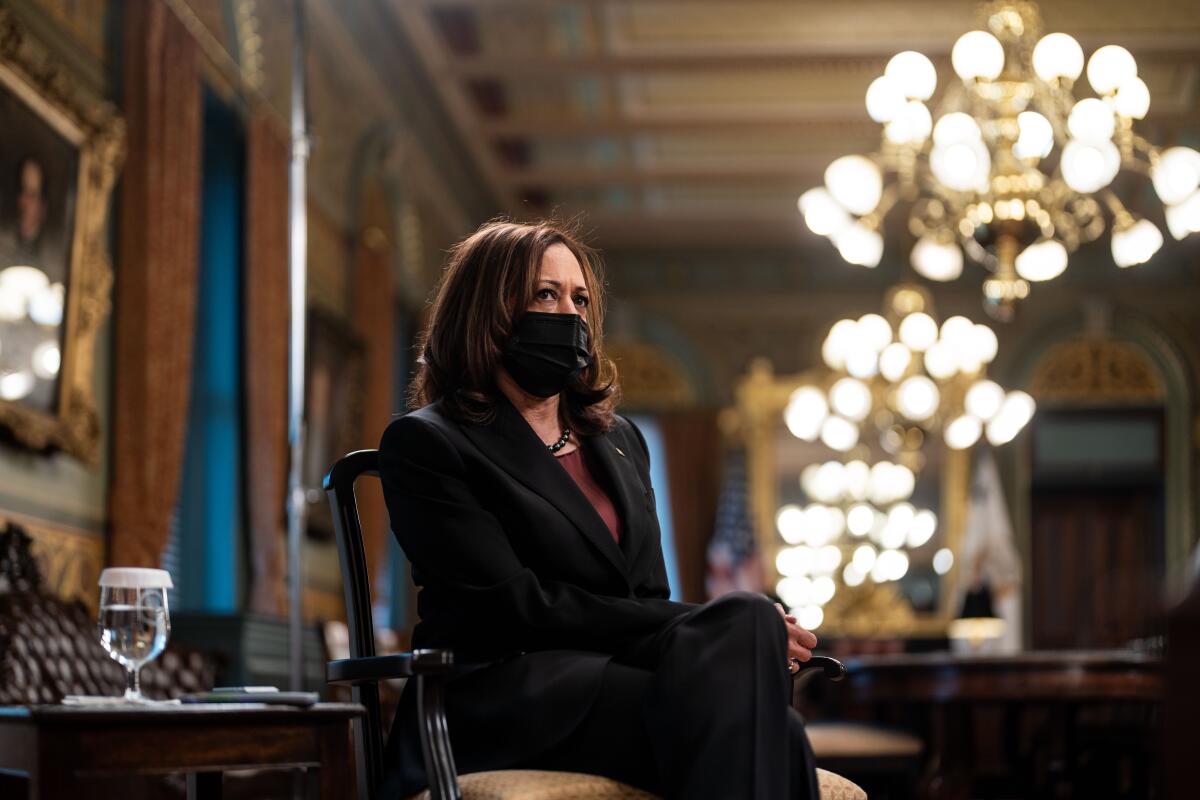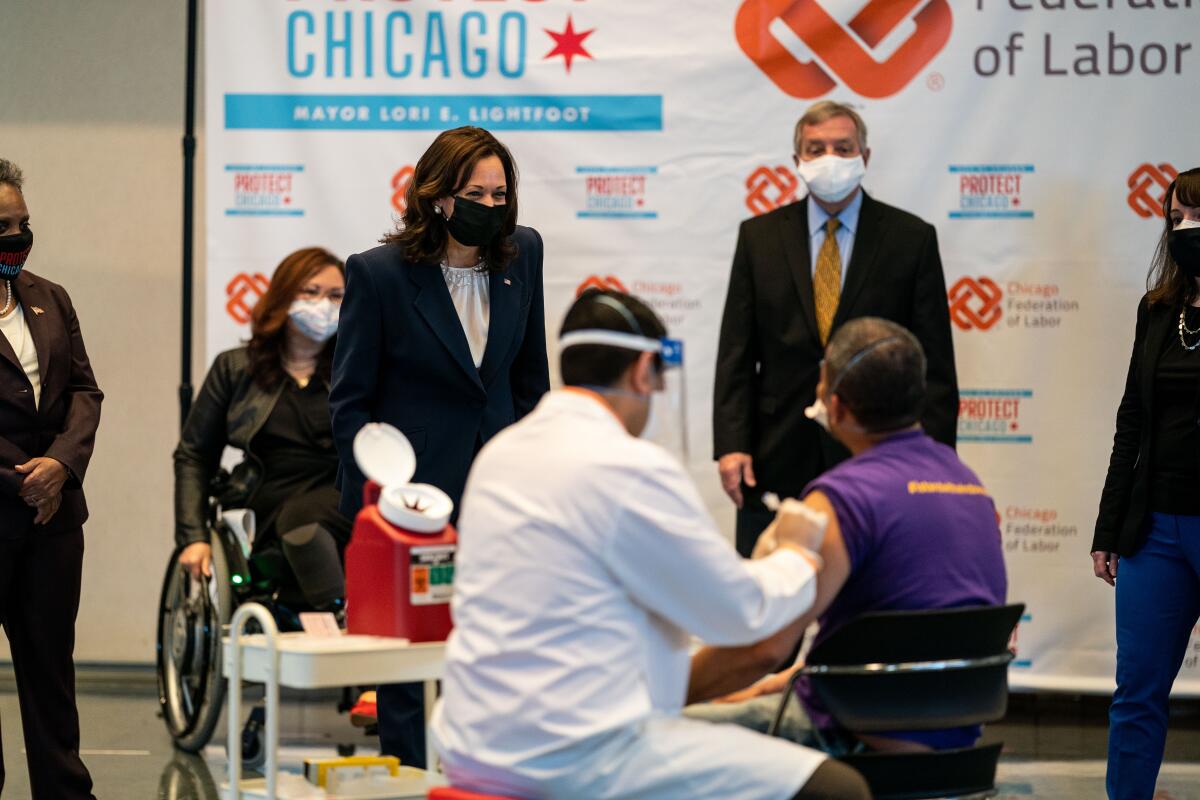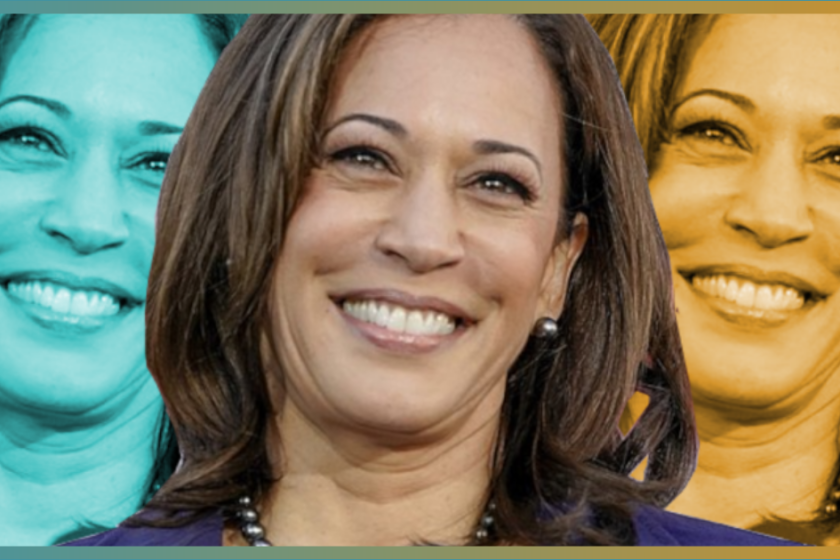Kamala Harris, in interview, says administration did not anticipate Omicron variant

- Share via
WASHINGTON — Vice President Kamala Harris said Friday that the administration failed to anticipate the variants that have prolonged and worsened the COVID-19 pandemic and that she underestimated the role misinformation would play in prolonging the disease that has killed 800,000 Americans.
“We didn’t see Delta coming. I think most scientists did not — upon whose advice and direction we have relied — didn’t see Delta coming,” she said. “We didn’t see Omicron coming. And that’s the nature of what this, this awful virus has been, which as it turns out, has mutations and variants.”
Harris made the comments during a wide-ranging interview with The Times in her ceremonial office, touching on immigration, women’s health, the criticism she has received for her management style and her role as a history-making leader. But the vice president returned repeatedly to the chief challenge of the Biden administration: battling a pandemic that — thanks to a new fast-spreading variant, Omicron — has led many Americans to put travel plans on hold, cancel holiday parties and stock up again on masks.
“I get it. I get it. I totally get it,” she said. “I mean, you know, one of the concerns that I have is the undiagnosed and untreated trauma at various degrees that everyone has experienced.”
President Biden celebrated “independence” from the virus in an upbeat July 4 speech, saying, “While the virus hasn’t been vanquished, we know this: It no longer controls our lives. It no longer paralyzes our nation. And it’s within our power to make sure it never does again.”
At the time, some public health experts warned that his optimism was premature, given that the Delta variant was already a significant threat.
Harris denied that the administration declared victory prematurely, or ever.
“We have not been victorious over it,” she said. “I don’t think that in any regard anyone can claim victory when, you know, there are 800,000 people who are dead because of this virus.”
Many Americans, particularly conservatives, resisted Biden’s call to get vaccinated against COVID-19, a measure public health officials say is critical to avoid hospitalization and death from the disease. Harris cited as a singular regret her failure to appreciate the power of misinformation in dissuading people to trust the vaccine.
“I would take that more seriously,” she said of the misinformation. “The biggest threat still to the American people is the threat to the unvaccinated. And most people who believe in the efficacy of the vaccine and the seriousness of the virus have been vaccinated. That troubles me deeply.”
But it could hardly have been a surprise to Harris. She spent much of her time in the administration’s early months trying to overcome hesitancy among some Black people, who have endured a history of mistreatment by the medical community. Former President Trump repeatedly promoted misinformation while in office, especially as the pandemic raged. He remains active in promoting the false claim that the election was stolen, a conspiracy theory shared by many of those who refuse to get vaccinated.
More than 70% of Americans have received at least one vaccine shot. But polling and state-level data suggest that Democrats are far more likely to have done so than Republicans. An investigation by NPR found that the higher a county’s vote total for Trump, the lower its COVID-19 vaccination rate.
Some conservatives have accused Harris of contributing to the politicization of the pandemic response, something she denied in the interview.

Harris hedged when asked in September 2020 whether she would take a vaccine if it was approved before the election, saying it would be “an issue for all of us” because “I would not trust Donald Trump.” She added, however, that she would trust “a credible source of information that talks about the efficacy and the reliability.
“He wants us to inject bleach,” she added, referring to Trump’s widely mocked suggestion in April 2020 that injecting people with disinfectant might kill the virus.
Harris cited the pandemic in response to questions about her role in the administration and the challenges it faces. Some Americans and political experts expected Harris to have an unusual level of clout and visibility. Biden, 79, is not only the oldest president in history but has served as vice president and has spoken of the role’s importance.
The Times is tracking the latest national opinion polls on the favorability of Vice President Kamala Harris.
While Harris has received some high-profile assignments, including overseeing the administration’s efforts to tackle the root causes of migration from Central America, she has not had the influence of some of her predecessors. As vice president, Biden was a principal deal-maker with Congress, led negotiations on a new government in Iraq and oversaw the Obama administration’s 2009 stimulus spending plan.
Harris said it was not a fair comparison because of what the Biden administration has faced in seeking to curb the all-consuming pandemic.
Harris would not say whether she thought her race and gender had contributed to the criticism she has faced as vice president.
“I’ll leave that to other people to evaluate,” she said.
The issue is complicated for Harris. She said she believes her representation as a Black woman has mattered on many issues the White House has tackled but was reluctant to single out some, like maternal health and reducing mothers’ mortality rates during childbirth, for fear of labeling them as special-interest causes.
“It should not have to be a priority based on race or gender when Black women are three to four times more likely to die in childbirth, native women are twice as likely to die in childbirth, rural women are 60% more likely to die in childbirth,” she said. “All of society is harmed in that way. And so I’m reluctant to attribute it to my race or gender, lest anyone decide that if you are not this race or gender, it should not be a priority.”
Harris’ highest-profile assignments involve pushing back against Republican efforts at the state level to limit voting rights and trying to reduce migration by addressing poverty, corruption and crime in immigrants’ home countries.
Neither has been easy. Two bills on voting rights lack the votes in the Senate to overcome a Republican filibuster. The number of migrants stopped near the border reached record levels this year.
Harris would not directly answer whether she should take responsibility for the record migration numbers or commit to a timeline for reducing them. Instead, she pointed to her work to draw more private investment to Central America, which this week reached $1.2 billion in commitments from dozens of private companies.
The immigration assignment has made Harris a magnet for criticism. The right has tried to saddle her with problems at the border. The left, meanwhile, was irate when she went to Guatemala over the summer and told migrants, “Do not come.”
The administration suffered a blow in its efforts to tackle immigration challenges on Thursday, when the Senate parliamentarian ruled that a series of law changes — including new work visas for some immigrants here illegally — could not be included in the administration’s sweeping environmental and social services bill. Biden and Harris have been crisscrossing the country seeking to sell the proposal, which is being pushed by Democrats in a way that does not require them to overcome a filibuster.
Harris expressed frustration at the ruling but did not offer an alternative plan.
“We have to keep appealing to the American people that they should expect Congress and their elected representatives to act on the issue,” she said in the 20-minute interview. “We can’t give up on it, that’s for sure.”
It is clear that some of the excitement Harris’ supporters felt with her election has given way to exasperation as she continues to face low approval and sustained criticism from Republicans and some Democrats. A recent wave of stories focused on high-level staff departures and her history of staff turnover that dates to her time as California’s attorney general.
Harris said she is toughest on herself, and many staffers and former employees would “talk about how they’ve been mentored and nurtured and supported” by her.
When asked to recall moments when she was struck by the history she was making, Harris said it happens all the time, particularly when she is at an event and parents show her photos of their children watching her being sworn in as vice president.
More to Read
Get the L.A. Times Politics newsletter
Deeply reported insights into legislation, politics and policy from Sacramento, Washington and beyond. In your inbox twice per week.
You may occasionally receive promotional content from the Los Angeles Times.












